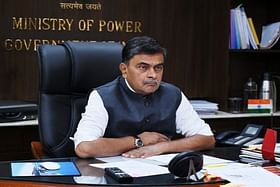India is also in talks with Japan and some other countries on carbon credit trade, linked with green hydrogen.
In a significant move, the government may allow overseas trading of carbon credits accrued in the country, but linked with green-hydrogen off-take from India.
The crucial move comes amid India achieving its self-determined climate action goals, called nationally determined contribution (NDC), ahead of target, Power and Renewable Energy Minister R K Singh said.
“Carbon credits that are transferred cannot be counted in a country’s NDCs. The good thing is India has achieved its first NDCs nine years in advance…So I will have carbon credits to spare and it makes sense for them to be sold worldwide, making my products cheaper,” he has told reporters in New Delhi.
Singh also said Indian Railways has set out a target of ‘Net Zero by 2030’ as the national transporter is on a mission to electrify the entire route and promoting use of solar and other renewable energy in a big way.
These NDCs form the bedrock of climate change mitigation plans agreed upon, by both developed and developing nations. In October 2015, India submitted its first NDCs to the United Nations Framework Convention on Climate Change (UNFCCC). According to Singh, goals have been achieved ahead of schedule.
Later in August 2022, India pledged higher targets and aimed to be a ‘Net Zero Carbon Emitter’ by 2070. Under the revised target, India committed to reduce emissions intensity of its GDP by 45 per cent till 2030.
“We have pledged higher NDCs in Glasgow (during 2022); that too we will achieve,“ Singh added.
He said that India is also in talks with Japan and some other countries on carbon credit trade, linked with green hydrogen.
“As far as transferring carbon credit outside the country again we are going to have a set of rules which will permit transferring of carbon credit outside…I am open to allow a part of the carbon credit to be transferred to the country which buys green hydrogen,” Singh explained.
The carbon credit trading framework is similar to the already existing renewable energy certificate (REC) mechanism prevalent in the country. These certificates allow polluting industries to offset their green energy commitments by purchasing the market-based instruments.
This allows them to defer immediate investments in clean energy procurement and generation, and also claim benefits of being a carbon-neutral enterprise.
But unlike RECs, which are largely voluntary, the compliance with carbon credit regulations will be mandated upon polluting industries. Further, export of carbon credits from India will help in capital flow to industries that generate clean energy.
Responding to a query on other renewable sectors that can be a part of the carbon credit trading project, Singh said, “That also we shall see. It will help us to bring down the cost of projects like off-shore wind and round the clock renewable energy.”
On European Union’s carbon border adjustment mechanism, Singh said that the ‘Green Hydrogen Mission’ of the country was being brought with the intent of reducing carbon content of India’s exports.
“We already have some pilots running on green steel, another pilot is being worked upon,” Singh said adding that different industries will try to reduce the carbon content of their products by using clean energy.
The Power Minister also said that off-shore wind project tender could be brought out soon.


